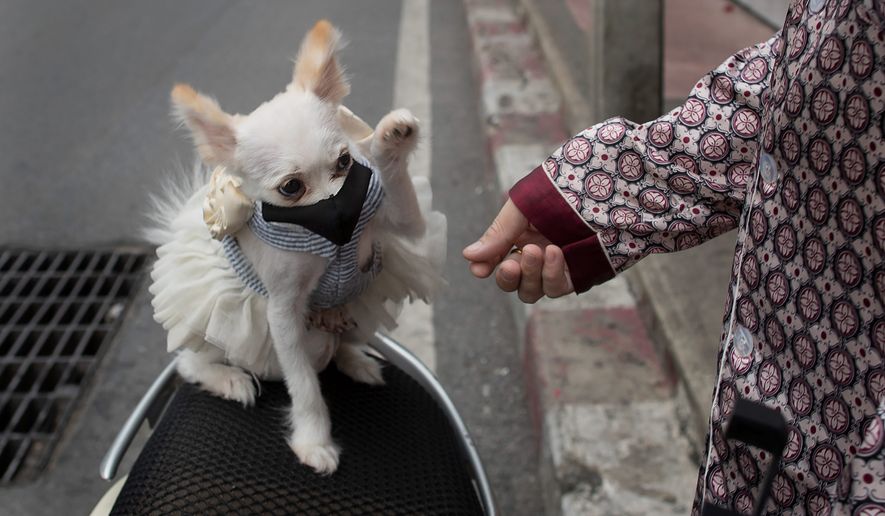New evidence shows that coronavirus variants can infect pet dogs and cats and, for the first time, mice.
Veterinarians in Texas and the United Kingdom this month reported infections of B117, the highly transmissible coronavirus variant in the U.K., in dogs and cats.
Texas A&M researchers detected the variant in a black Lab-mix dog and a domestic shorthair cat from the same household in Brazos County. The pets were tested last month after their owner was diagnosed with COVID-19 two days earlier.
“Surveillance of SARS-CoV-2 [the virus that causes COVID-19] in animals in and around households and genetic investigations of the virus from infected pets are critically important for understanding the transmission and evolution of the virus as well as predicting what may happen next,” said Dr. Sarah Hamer, a veterinarian and epidemiologist for the Texas A&M College of Veterinary Medicine & Biomedical Sciences.
Dr. Hamer served as the lead investigator for the study that uncovered the variant in pets, and is part of a collaboration of scientists who are testing pets for COVID-19 to learn more about the spread of the virus from people to animals.
In the U.K., researchers found that dogs and cats were infected with B117 about three to six weeks after their owners and handlers began experiencing coronavirus respiratory symptoms. The infected pets also developed heart problems, but it is unclear if they were linked to the virus or already present.
Meanwhile, French researchers have discovered that the B1351 variant from South Africa and the P1 variant from Brazil can infect lab mice, raising questions about whether mice and other rodents living close to humans can become “secondary reservoirs” for the coronavirus with potential spillback to people, according to a preprint published last week in the journal BioRXIV.
The researchers, most of them from the Institut Pasteur in Paris, found that the wild type viruses were unable to infect mice since they couldn’t bind to the receptors on their cells, but that the B1351 and P1 variants could. If scientists wanted to test SARS-CoV-2 in mice before, they had to use a mouse that was specifically bred to carry those ACE2 receptors, MedScape reported.
A virus can spread and evolve once it establishes itself within a population of animals and eventually could jump to humans, which is why birds and pigs are closely monitored for influenza viruses.
“Different species have different susceptibilities to any coronavirus, including SARS-CoV-2. It would be a concern if pigs and cattle were infected; fortunately, they have not been able to be infected with this coronavirus to date,” said Dr. Tanya LeRoith, director of Virginia Tech Animal Laboratory Services.
Farmed minks are the only animals so far that have caught the coronavirus and passed it back to people.
Researchers detected outbreaks of coronavirus disease among escaped minks living near mink farms in Utah last year. The free-ranging minks had coronavirus antibodies, suggesting the virus could spread to wildlife, the researchers said in a letter published last month in the journal Emerging Infectious Diseases.
Dr. Laura Hungerford, a professor of population health sciences at the Virginia-Maryland College of Veterinary Medicine, said most animals seem unlikely to catch the virus from humans because of how it “binds to cells; animals without a good match for the spike protein to bind to resist infection.”
“As the virus mutates, it is important to watch to see if it changes in a way that allows it to be more infective for nonhumans,” Dr. Hungerford said. “But, as the virus becomes more human-adapted, it may be even less likely to infect other species.”
Dr. LeRoith said most infected pets show no clinical signs, but some experience symptoms such as fever, cough, vomiting or diarrhea. The virus does not spread easily from animal to animal, especially among pets, which catch the illness from their owners, she said.
Zoetis, a global animal health company, has an experimental coronavirus vaccine that was administered to Great Apes in the San Diego Zoo, according to Dr. LeRoith. She added investigators at Virginia Tech also have developed a SARS-CoV-2 vaccine that is cross-protective against a coronavirus in pigs and has the potential to be used in multiple species.
• Shen Wu Tan can be reached at stan@washingtontimes.com.




Please read our comment policy before commenting.